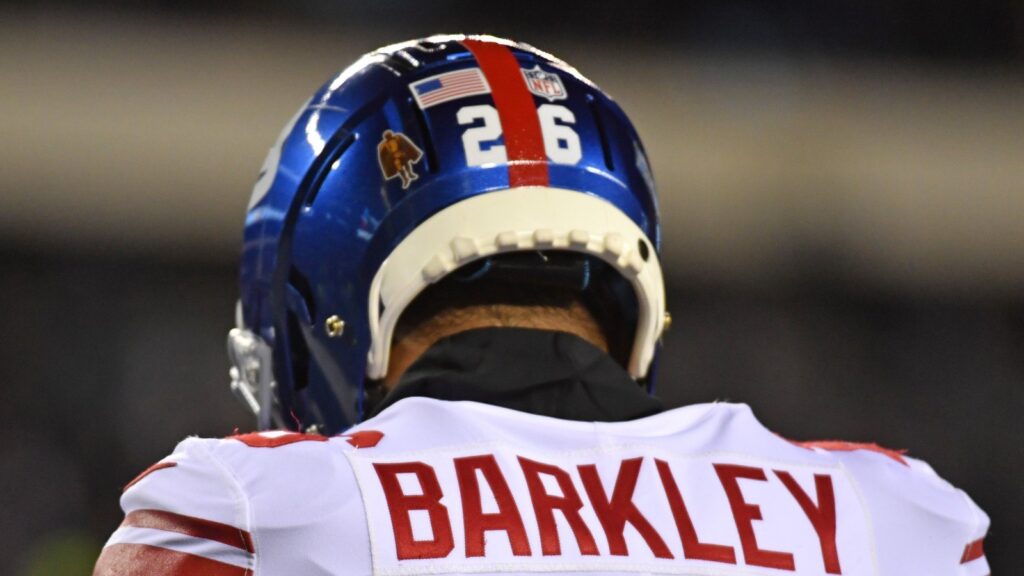Here's What The Data Says NFL RBs Are Worth Now

Promo Code: BOOKIES
No one wants to pay running backs anymore. As NFL training camps open, the talk is all about the devaluation or running backs. Why can't running backs get paid anymore? Blame Todd Gurley (we’ll get to that in a second).
But more importantly, what should a responsible, salary-cap conscience NFL team pay a star running back?
What Is An RB Worth in Today's NFL?
Bookies.com created a weighted RB scale based on 15 years’ worth of stats (RB production on both rookie contracts and second contracts) and financial data to find the optimal RB contract for Saquon Barkley, Josh Jacobs and other big names now, and in years to come (Jonathan Taylor, Nick Chubb et al).
We grabbed the most efficient second-contract running backs since 2008 (warning: it's a very short list). What we found? A responsible team should spend about 4% of the salary cap on the running back position.
That means the going rate for Barkley (and other elite backs like Jacobs and Pollard) - based on Bookies.com's extensive analysis and the current $225 million cap - should be $9 million per year. In other words, 4 years, $36 million, or 3 years, $27 million are reasonable offers in this sense (to be clear, since NFL contracts aren't guaranteed, these figures omit the "funny money" figures that agents use to inflate the value of NFL contracts).
While Saquon Barkley budged and agreed to a one-year deal with the Giants that essentially amounts to the franchise tag number, plus incentives, it's not what he wanted and the disconnect when it comes to paying RBs remains.
Here's why: Bookies.com's $9 million per year “Optimal RB Contract” range is lower than the actual franchise tag for RBs ($10.9 million). Therein lies the problem: It's an NFL spin off of Dr. John Gray's wildly successful book on relationships. In this case, it's general managers are from Mars, running backs are from Venus.
Methodology:
We looked at every RB over the past 15 years, then analyzed their production based on the following criteria:
- Games Played
- Touches per season
- Yards Per Touch
- TDs
- % of Salary Cap Used
We then extracted the most efficient second-contract running backs (during a 3-year span) and averaged the percentage of the cap they accounted for. We essentially created a ‘bang for your buck’ framework for what the ideal running back contract should look like from a salary cap perspective.
Take a look at the most efficient second-contract RBs over the past 15 years.
RELATED: What's The Optimal QB Contract To Win a Super Bowl?
Promo Code: BOOKIES
The problem with the running back market is even the guys we think of as stars (let's say at least 1 All-Pro appearance since 2013) haven't been reliable when given a second contract. That doesn't bode well for guys like Melvin Gordon, who we'll get to in a minute.
Why NFL GMs Are Afraid to Pay RBs Now
It's pretty easy to see why giving big second contracts to running backs is frowned upon. Of those ten players on the list above, eight saw a decline in their production.
LeSean McCoy and Derrick Henry were the only two running backs who improved after their rookie deals.
Both players didn't get a ton of work early as McCoy (1,055 touches) and Henry (861 touches) were used in committees to start their careers. Compare that to someone like Ezekiel Elliott (1,358 touches) and it's easy to see why Henry and McCoy were fresher during Year 5 and Year 6 of their careers.
Take a look at how those same All-Pro running backs we mentioned above produced on their rookie contracts.
The most notable difference here is the yards-per-touch difference. The 12 All-Pro running backs averaged 5.2 yards per touch during their rookie contracts, while the same group averaged 4.7 yards per touch on their second deal. That is despite the average cap hit per season rising from 1.7% to 4.4%.
It's also worth mentioning that teams like the 49ers and Rams lowered the cap hits of McCaffrey and Gurley in the early parts of their second contract to maximize a Super Bowl window. McCaffrey is only scheduled to count 1.4% of the 49ers cap in 2023, but that number moves up a whopping 5.5% in 2024 and 5.1% in 2025.
In general, smart teams likely will stay under that 4% average cap hit. But if they decide to pay a running back more than that, they will give that type of contract to a running back with fewer than 1,000 career touches and someone who has improved every season.
A perfect example might be Tony Pollard, who has just 631 career touches in the NFL but has averaged 5.7 yards per touch. For the Cowboys, it might be worth giving him a three-year deal worth $27 million as his best football could still be ahead of him.
The running back market has undoubtedly changed a ton over the last few seasons, and some excellent players have gotten lost in the shuffle.
Promo Code: BOOKIES
Todd Gurley, Zeke & the Devaluation of RBs
So how did we get here? Running backs from Barkley, to Jacobs, to Pollard, to … Melvin Gordon (he’s the one who recently said playing running back “literally sucks”) are under siege. Barkley, Jacobs, Pollard and yes – Gordon, who remains an unsigned free agent, can blame Les Snead, Sean McVay, Todd Gurley and the Los Angeles Rams for this mess. In fact, Gordon has blamed McVay.
Gurley was the No. 10 overall pick in the 2015 NFL Draft and had an incredible start to his career. In the first 44 games of his career, he totaled 4,599 yards from scrimmage while scoring 35 touchdowns. With two years left on his deal (plus the option for a franchise tag), the Rams rewarded Gurley with a contract extension through the 2023 season that would pay him up to $57 million with $45 million guaranteed.
A year later, Ezekiel Elliott would receive a deal that topped Gurley’s ($50 million in guarantees). Elliott's record-setting deal of $50 million guaranteed is still the most guaranteed money to a running back.
But the issue the Rams ran into was that by the 2019 season (final year of Gurley’s rookie deal), he was done. Gurley averaged just 3.8 yards per carry that year and was released after the season.
By the end of the 2020 season, he was out of the league. From then on, teams would be terrified of giving a veteran running back (even an All-Pro running back) a major contract. The draft-and-replace strategy is becoming quite popular in the NFL as it’s something that a lot of winning teams and coaches (Andy Reid, Bill Belichick, Mike Shanahan) have done for years.
It's OK to avoid overpaying running backs like Todd Gurley and Ezekiel Elliott, but not paying them at all (or very little) is still a bit extreme. Hopefully, NFL front offices and the top running backs can find some common ground to get some of the most talented players in the league paid again.
Promo Code: BOOKIES
About the Author

Marcus Mosher covers the NFL for Bookies.com. The managing editor of The Raiders Wire is also a contributor to The Athletic DFW, Pro Football Weekly and FanSided.
Comments